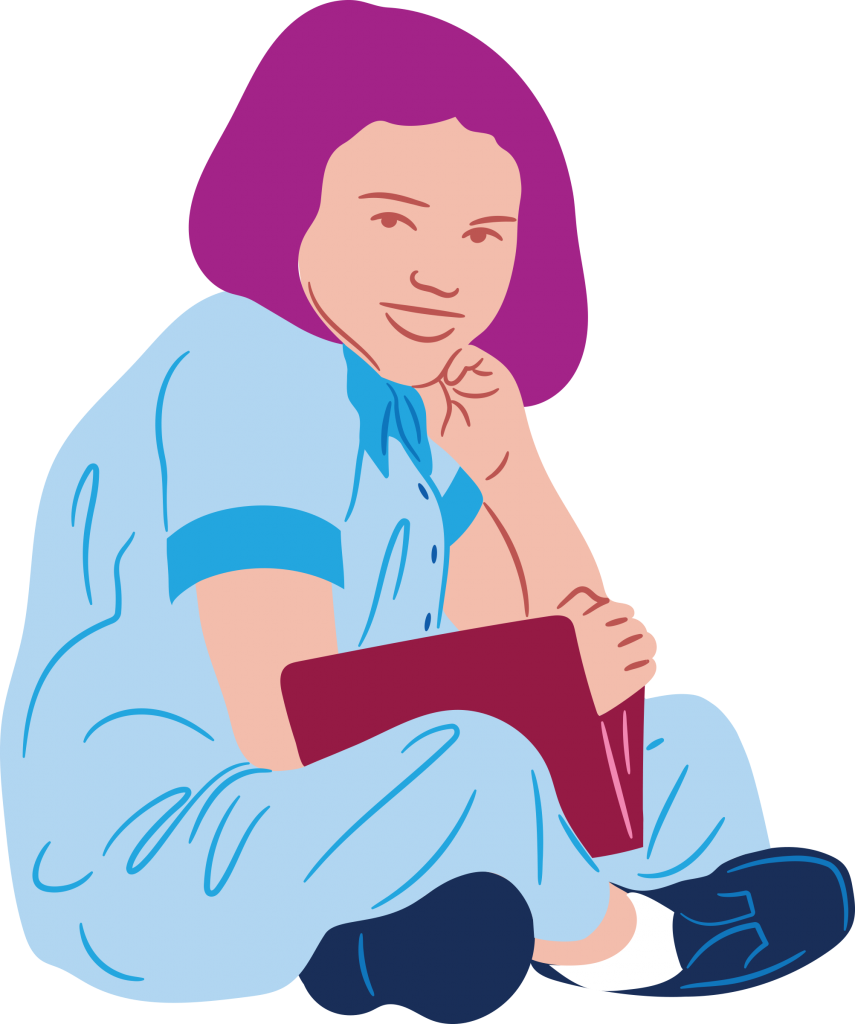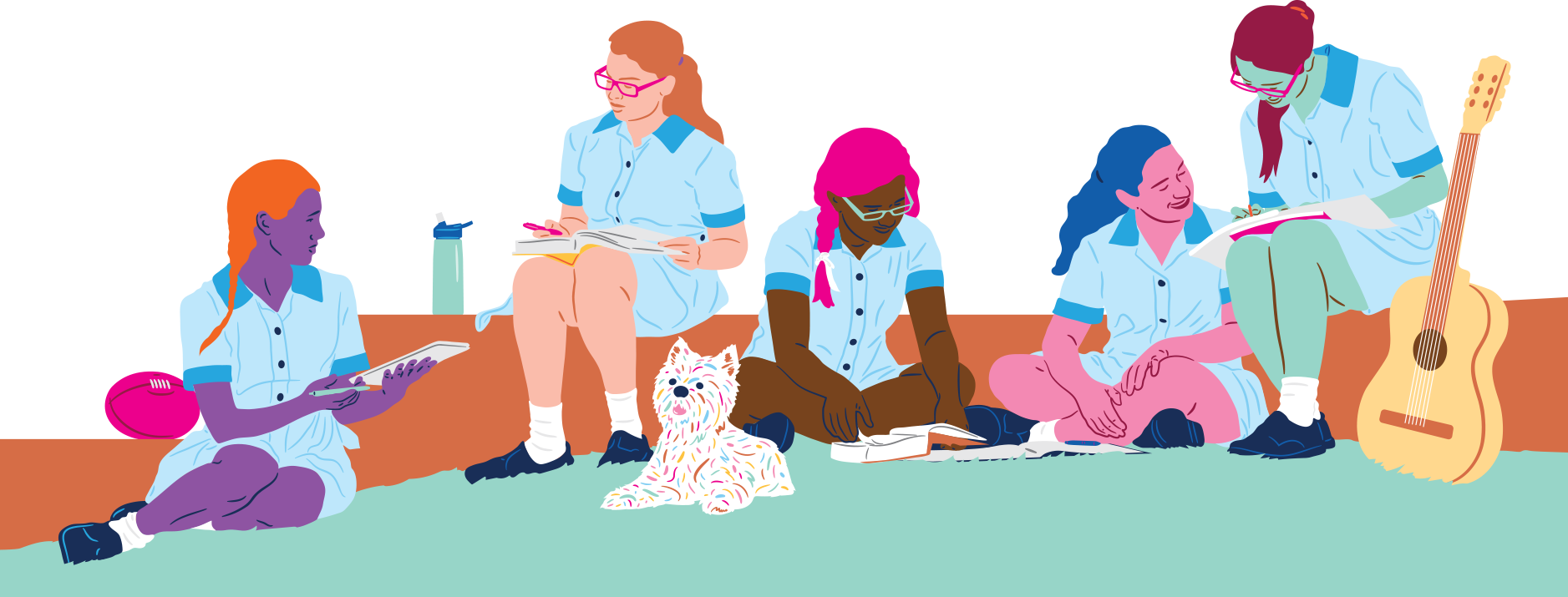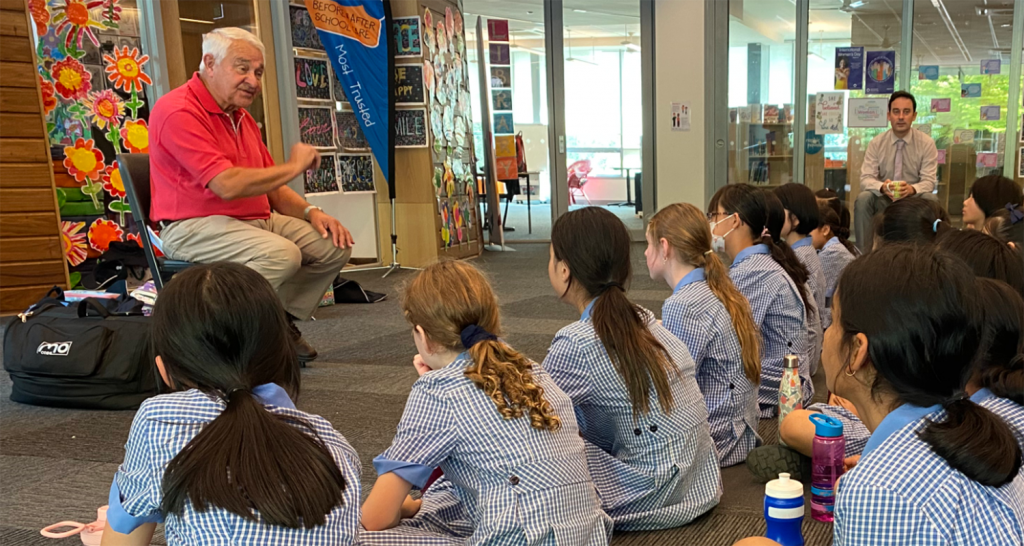
School Sport Victoria (SSV) organised the Boroondara Division Swim Carnival on Wednesday 8 March at the Monash Aquatic & Recreation Centre and Ormiston had nine swimmers that qualified for this competitive from the North Balwyn District Carnival the previous week. Congratulations to the following Year 4 – 6 swimmers that performed with a considerable amount of courage and confidence on the day:
Faye Liu – Year 4 competed in the 200m freestyle relay
Claire Zhang – Year 4 competed in the 50m freestyle, 50m backstroke & 200m freestyle relay
Alessandra Ronzani – Year 4 competed in the 50m butterfly & 200m freestyle relay
Audrey Cheung – Year 4 competed in the 200m freestyle relay
Zoe McManemin – Year 5 competed in the 200m freestyle relay
Ivy Xie – Year 5 competed in the 50m freestyle, 50m backstroke & 200m freestyle relay
Elfie Fan – Year 5 competed in the 200m freestyle relay
Ruth Whelan – Year 6 competed in the 50m freestyle & 50m breaststroke
Joyce Zhang – Year 6 competed in the 50m breaststroke & 200m freestyle relay
All students were very competitive in each of their events
A special mention must go to Claire Zhang who won her 50m backstroke event. Claire has now qualified for the Eastern Regional Metropolitan Swim Carnival coming up in the next few weeks.
We are very proud of our swimmers and we look forward to Claire’s upcoming swim event and the Girls Sport Victoria (GSV) Swim Championships in Term 4.
I wish all our Ormiston families a wonderful weekend.
Paul Donohue
Head of Junior School
Our kindergarten program at CGGS is based on the National Early Years Learning Framework (EYLF) and we aim to create a stimulating and supportive learning environment that fosters each child’s sense of belonging, being and becoming. Play is an essential component of this, as it helps children develop their social, emotional, cognitive and physical skills (through play, children learn to share, communicate, negotiate, take-risks and problem-solve, which are essential skills for life-long learning).
Earlier in the year the EL staff engaged in a course looking at the Playwork principles, emphasising the importance of creating a safe and stimulating environment that allows children to explore their interests, engage in spontaneous and self-directed play, and interact with their peers. We have been observing and documenting the children’s play and interactions, and we have noticed that they are starting to form social connections and developing positive relationships with their peers. This links with the research that talks about play being crucial for children’s mental health and wellbeing.
We have been intentional in creating opportunities for children to engage in collaborative and cooperative play, which promotes social connections and fosters a sense of community. We have facilitated whole group games where we practice singing one another’s names, finding a partner to engage in the daily routines, or working together on collaborative painting. We have been promoting outdoor play and this has allowed the children to create stories, (sand pit, ‘office’ set up, water play, musical instrument exploration) as well as engaging the children in physical activities like singing nursery rhymes on the outdoor obstacle course which engage children in physical play, all the while promoting social connections as they connect with their environment.
As parents, it’s important to create opportunities for play in our children’s lives. This might be setting aside time for unstructured play, providing a variety of resources and materials that promote creative play or encouraging outdoor play with other children.
Melinda Murphy & Sophia Stirling
Early Learning 3 Teachers
“It seems to me that the natural world is the greatest source of excitement; the greatest source of visual beauty; the greatest source of intellectual interest.”
David Attenborough
During the past few weeks, the children have developed a curiosity towards and an interest in leaves. As curious learners, the children have actively looked for leaves in all areas of our Early Learning Garden, on the footpaths as they’ve walked to school and at home.
We’ve engaged in mathematical discussions about the length, shape, colour, and markings on the leaves. We’ve counted the leaves, compared their length and shape, sorted, and ordered them according to size, and identified their similarities and differences.
As researchers, the children used lenses to observe the intricate details of the leaves and recorded their observations through the languages of drawing, dialogue, and photography. The drawings were the external representations of the children’s observations and thinking and were used as provocations to explore and name unfamiliar parts of a leaf, for example, the apex, margin, midrib, and petiole.
The children were provided with an opportunity to view some of the work of the artist James Brunt. He has an interest in and is inspired by nature. The children were captivated by Brunt’s installation with clay leaves. As open-minded thinkers, collaborators, and creative communicators, they worked towards a shared goal of creating a mandala with their collection of leaves.
It is through these experiences that children develop dispositions for learning such as curiosity, creativity, imagination, and a sense of wonder and awe. They’re also learning about inquiry, being researchers and investigators and discovering that when they take the time to closely observe things from nature, they will notice things they have not previously seen. These experiences also provide opportunities for the children to express and document their learning, observations and findings in different ways.
Angela Follacchio
Early Learning 4 Full Time Teacher
“When children play they are making sense of their social world. In play they create and recreate their understanding of what they believe to be normal behaviour for boys and girls, women and men. They construct their play using what they have distilled from the adult world about normal gendered ways of being, thinking and acting.” (MacNaughton, 2000)
Though we strive to understand children, their identities, and the lives they live, social justice themes such as ‘International Women’s Day’ prompts us to recognise and engage in culturally responsive pedagogies. At the ELC we embed this critical knowledge by using different texts, materials and provide rich environments that represent diversity in culture and abilities. Participating cognitively and emotionally when it comes cultural competency in the early years is about asking questions, reflecting, being open, reciprocal, and trusting, when it comes to ‘big ideas’ such as gender roles (Chapman, 2022).
The Early Years is a time for children to develop understanding, navigate and explore gender, and the discourses around gender. In everyday life, there are subtle ways in which gender roles are represented from pop culture to professions to parenting. During the week of ‘International Women’s Day’, the EL4 children engaged in gender-expansive experiences which addressed gender roles in a meaningful way. The children investigated notable women such as Frida Kahlo, an artist; Marie Curie, a scientist; Cathy Freeman, a sportswoman; and Maria Montessori, a teacher. Time and time again, all roads led back to ‘mum’ as being a significant woman that influenced each child’s life.
As reflective thinkers, the EL4 children listened to the story books ‘My Mum’ by Anthony Browne and ‘A Mother is a House’ by Aurore Petit, that highlighted the varying roles a mum plays in everyday life. They were invited to ponder the question “What makes a mum important?”:
Kiki: They do everything (mums), they’re superwoman.
Scarlett: They’re magical like a unicorn. You can climb on their back, and they can take you anywhere.
Xavier: My mum cooks lots of different foods and she doesn’t need a book.
Miya: My mum carried me in her tummy.
Chloe: My mum looks after me, she goes to work too.
By providing opportunities with a gender lens, children are encouraged to acknowledges the inequalities that occur between gender and promoting them to be mindful, respectful, and kind to others when it comes to their lives and actions.
Chapman, R. (2022.) Moving beyond ‘gender-neutral’: creating gender expansive environments in early childhood education. Gender and Education, 34(1), 116.http://doi.org/10.1080/09540253.2021.1902485
MacNaughton, G. (2000). Rethinking gender in early childhood education. Sydney: Allen & Unwin.
Esther Wong & the EL Team
Early Learning Coordinator & EL4 Part Time Teacher
This week we have been thrilled to welcome Murrundindi, elder of the Wurundjeri people back to Junior School for the first time in Term 1.
Students in Year 1 viewed several aboriginal artefacts on display at Senior School. Murrundindi helped students to further develop their understanding of how events, stories, and objects from the past help us to understand our present. They learnt about the uses of a boomerang, coolamon, club, berry basket and an eel trap. The students also were able to hold an ancient stone axe, which was over 30 000 years old. Murrundindi also shared photos of his ancestors and talked about how food and clothing was sourced in the past.
The following students were keen to share their experience:
Jessica – I learned that animals were used for shelter and food.
Ruby – We touched the stone axe. It was over 30 000 years old!
Isabella – I learned that babies were put in a coolamon and the trees could tell us when it’s eel season.
Evelyn K. – Kangaroo skin is used for a lot of things and the little boomerang was very smooth to touch.
Madison – I loved the berry basket. The ladies picked berries and put them in the basket.
Elena – I liked seeing the big boomerang.
Olivia – In the past, Aboriginal people used animals to make clothes.
Murrundindi performed a Welcome to Country ceremony with the Year 5 students and explained the importance of respect in Aboriginal culture and the role of elders in the community. Anjali shared with Murrundindi her Acknowledgement of Country artwork that depicts a visual representation, showing awareness of and respect for, the Aboriginal Traditional Owners of the land. To assist the students with their exploration and understanding of Colonisation in inquiry, Murrundindi worked with the students to help them visualise timelines and gain an understanding of how long First Nations people have been living on and caring for the land.
These rich learning experiences with Murrundindi help our students to make connections to their learning in class and gain a deeper understanding of Indigenous traditions and culture. We look forward to his next visit early in Term 2.
Nancy Robottom
Acting Deputy Head of Junior School
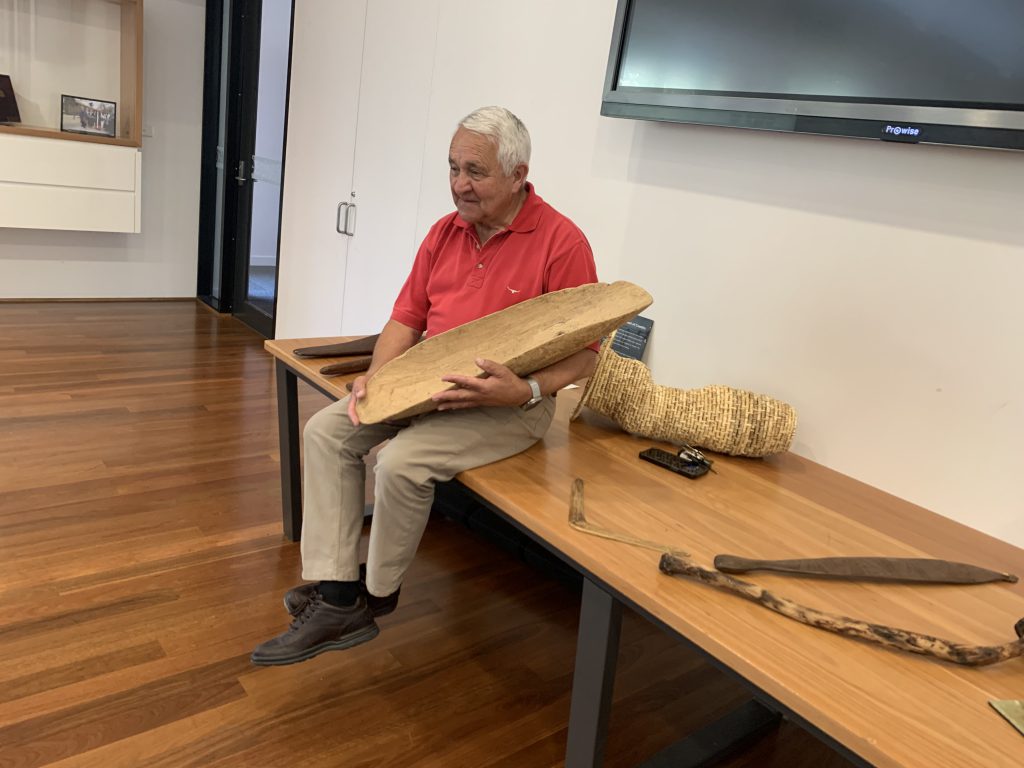
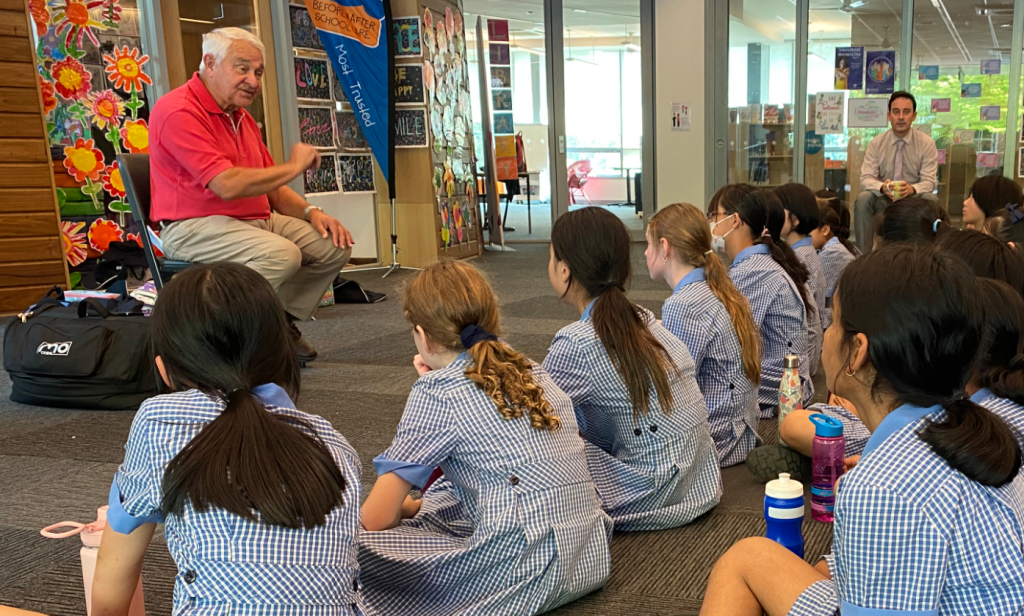
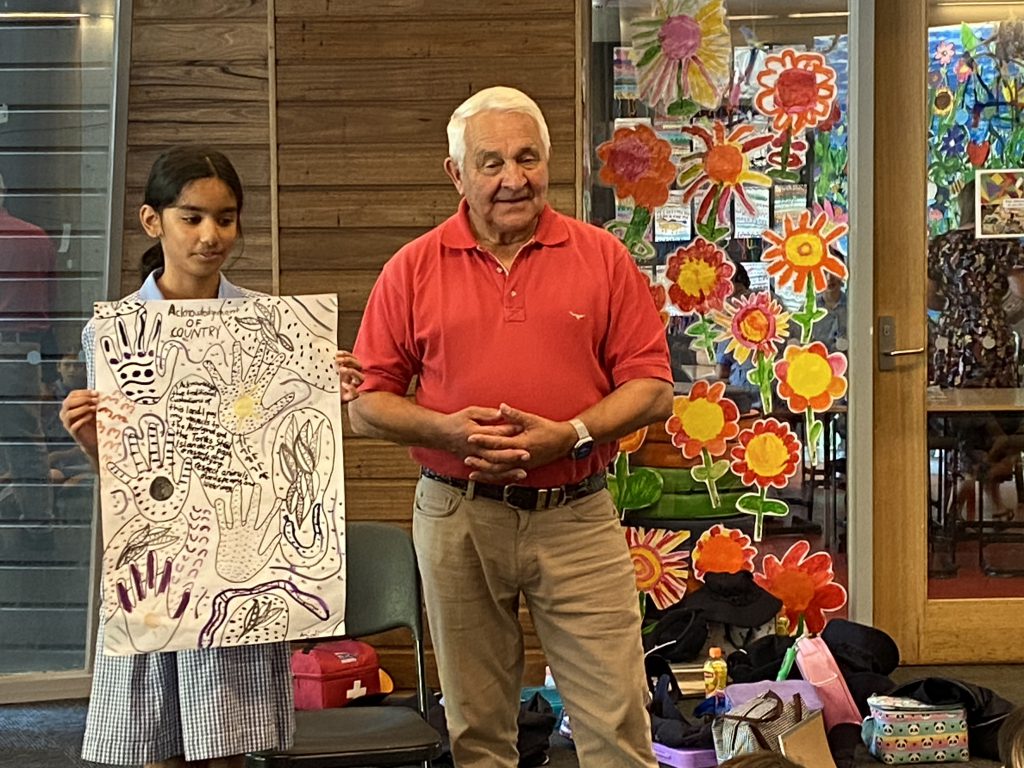
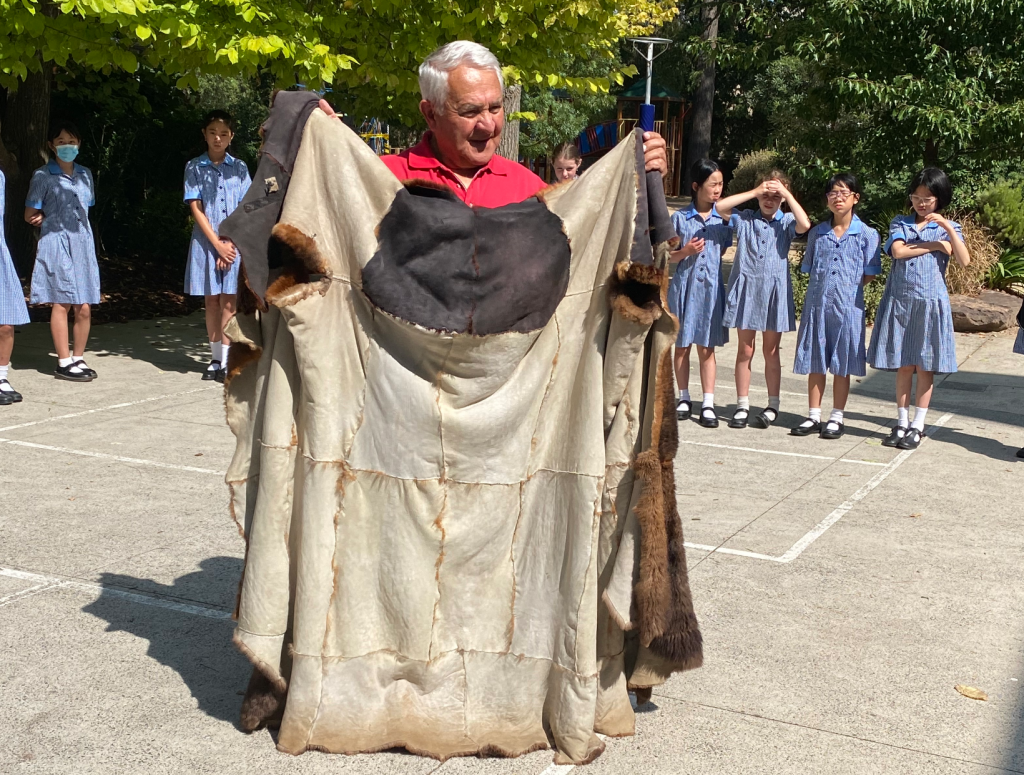
Year 2 students are delving into the topic of Health in their Inquiry unit. To help them gain a better understanding of healthy behaviours, our students are participating in hands-on STEAM and Science sessions. During these sessions, they are learning about the science behind healthy habits.
One of the healthy habits we discussed was the importance of brushing teeth after meals, particularly after consuming sugary foods. We looked at images of microbes and discovered that they are living things, just like us, but much smaller. Too many harmful microbes living in the mouth can lead to cavities and plaque, which is why it is essential to keep them in check.
To demonstrate this concept, we conducted an experiment that compared the growth of yeast in an environment with and without sugar. . It was exciting to see the yeast thriving and overflowing when sugar is present, and making the link that by brushing our teeth, we can reduce the amount of sugar in our mouths and promote better oral health.
As well as practicing their skills of observing and predicting, this activity was an introduction to the scientific method, laying the foundation for future learning in the sciences. Conducting this activity during the week of International Women’s Day reminds us of the importance of empowering girls to value, enjoy and pursue science education.
Penny Dumsday
Science Teacher
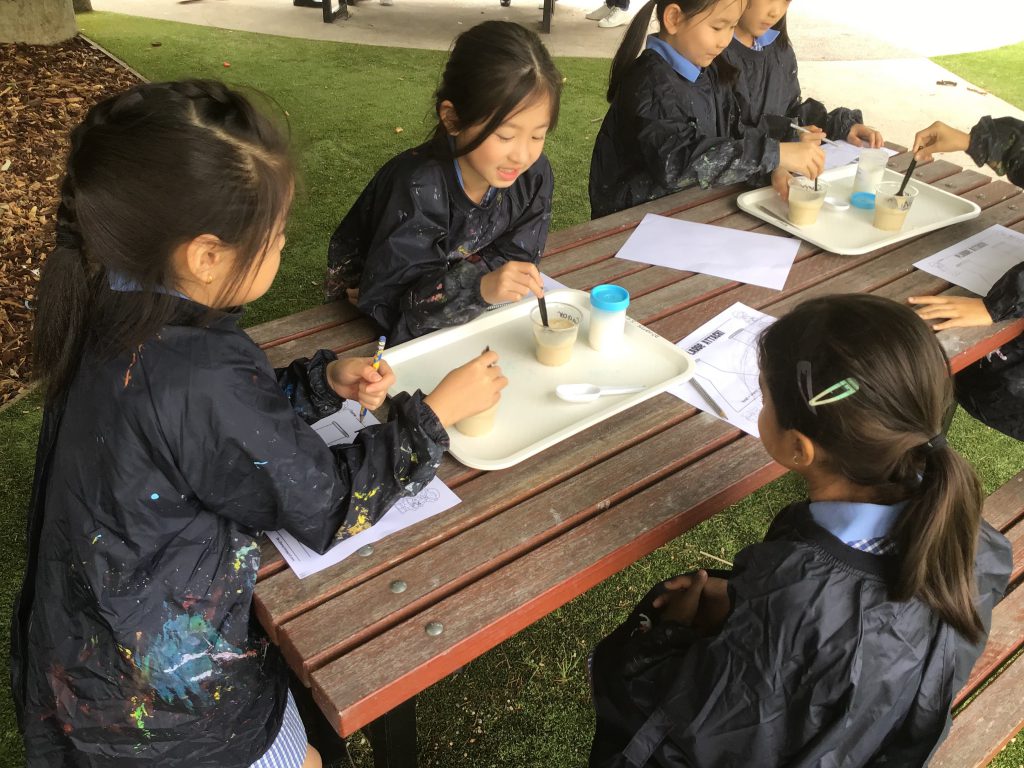
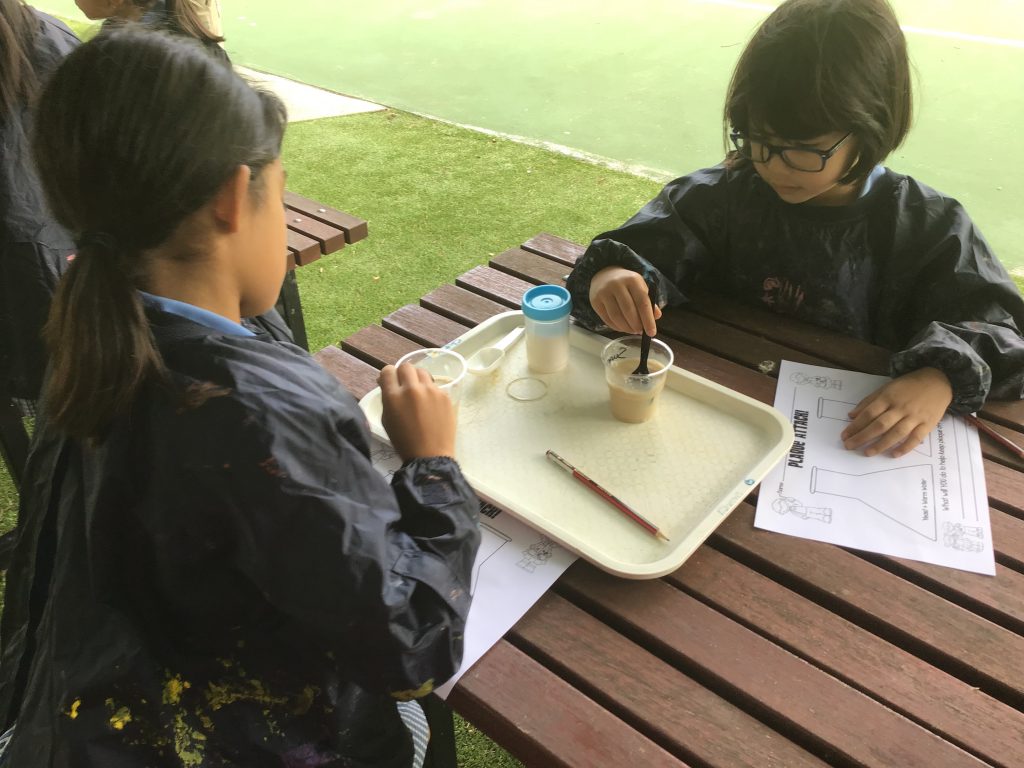
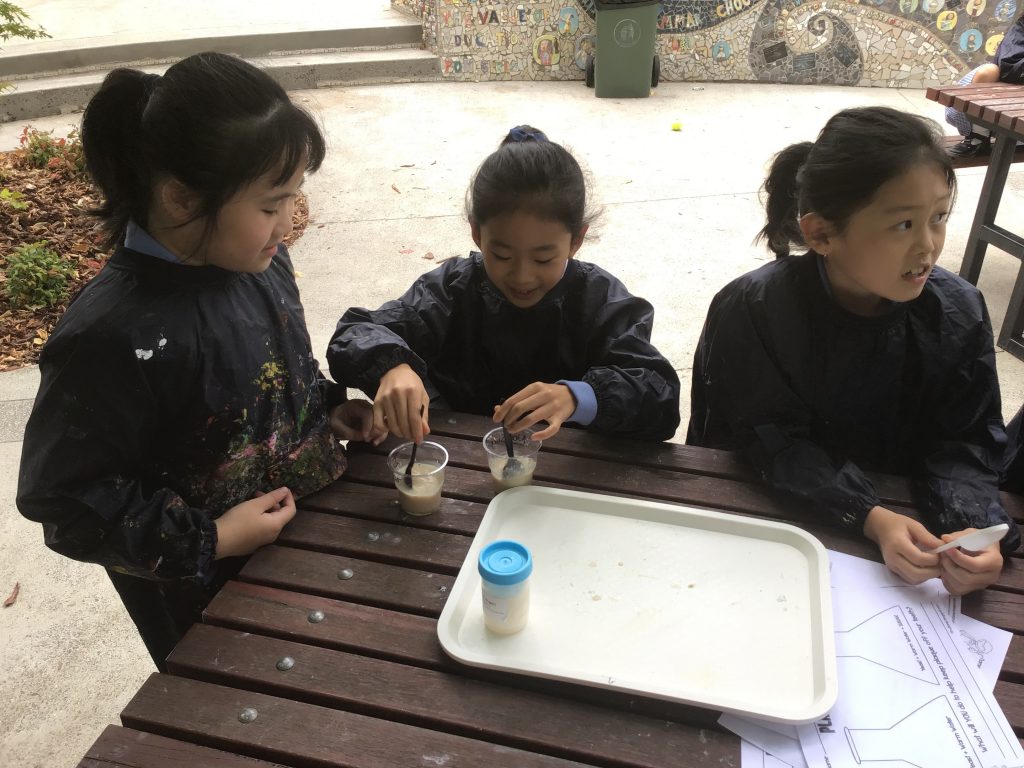
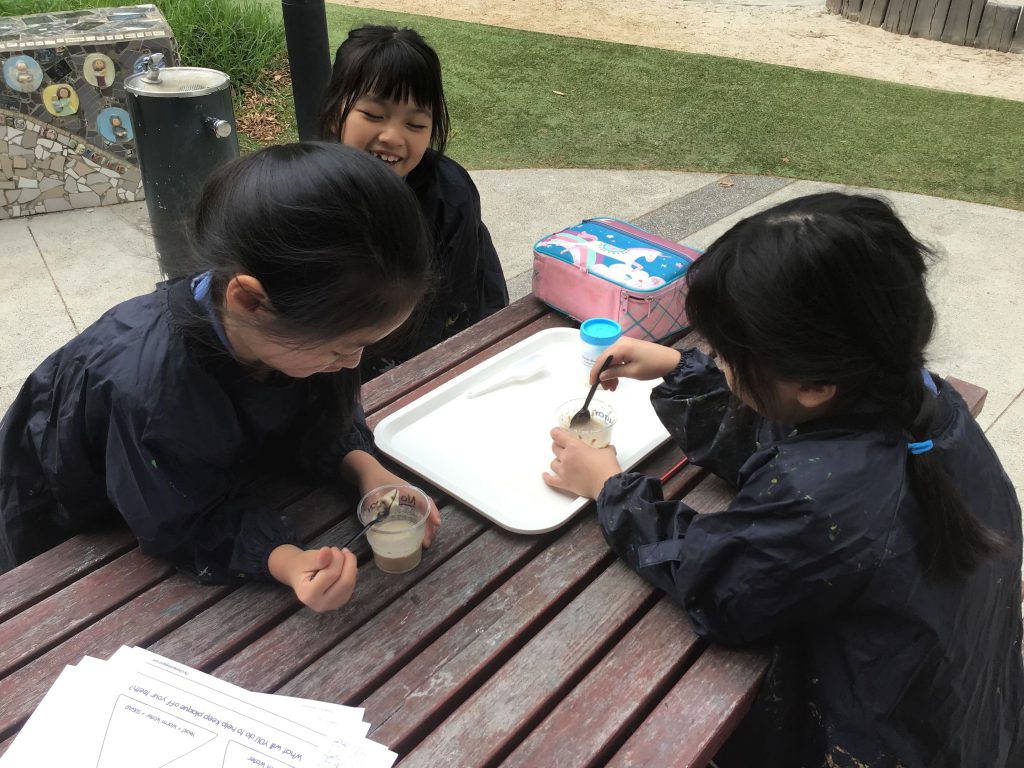
The teaching of musical elements and knowledge in the Year 5 & 6 Class Music Program has become quite focused in 2022 and 2023.
The goal has been to link the Class Music Program closely with the Year 5 & 6 Concert Band Program to enhance individual student instrumental learning outcomes.
By far the educationally most impactful new Class Music initiative has been the introduction and development of the student Instrumental Learning Journals.
Every Year 5 & 6 student keeps a journal of the development of their instrumental skills. Students are encouraged to make use of the daily home learning time allocated. Each week students are encouraged to submit a recording (with backing track) of the piece they are learning as part of the Concert Band Program.
Our CGGS Year 5 & 6 students are learning that regular home practice of skills learnt in their instrumental lessons at school is an important strategy for anyone wishing to progress when learning to play a musical instrument.
The success of this Class Music initiative is clearly measurable. Students are submitting wonderful performances reflecting their growing confidence as instrumental performers.
Their journals reflect the pride they feel when they conquer the challenges presented, both musically and in using the appropriate technology to submit their performances.
They show happiness in their ability to enjoy beautiful music as they develop as musicians.
As a result of monitored weekly practice, students are able use the individual feedback given via the instrumental learning journals to progress at their own rate and enjoy the opportunity to benefit from this differentiated learning environment.
Instrumental tutors are noticing that more and more Year 5 & 6 students are highly motivated to learn and participate in music performance activities. They are also performing at a much higher standard than previously.
Penny Byrne
Music Teacher
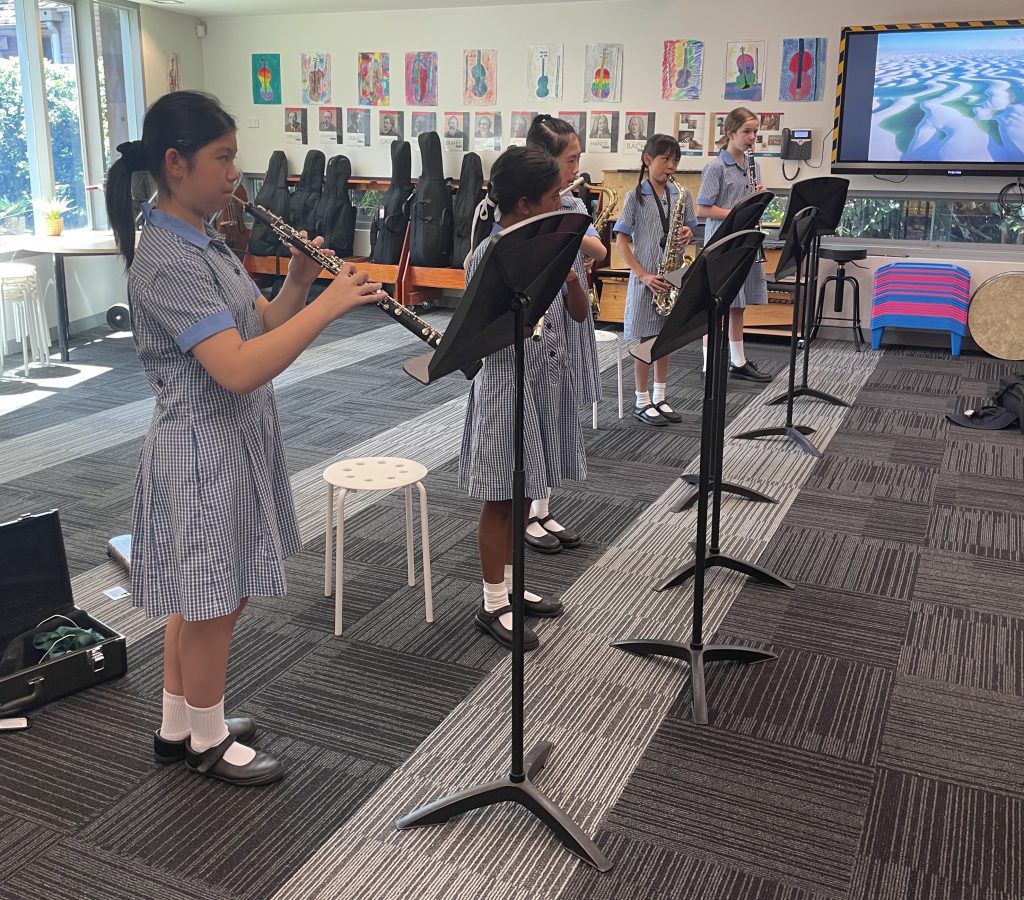
“We acknowledge and pay respect to the Wurundjeri people as the traditional custodians of the land on which the school is situated.”
Secondary School / Administration
2 Torrington Street, Canterbury
Victoria 3126 Australia
T +61 3 9813 1166
F +61 3 9882 9248
camgram@cggs.vic.edu.au
Junior School / Ormiston
